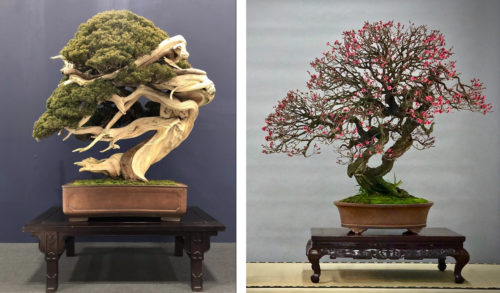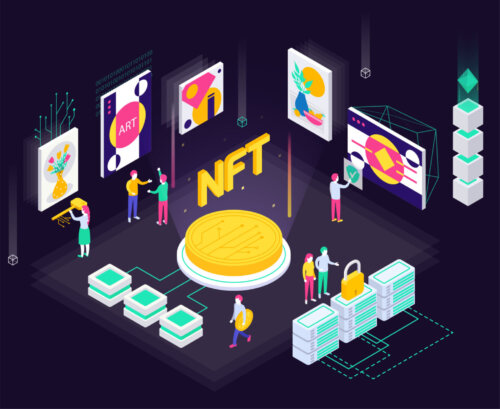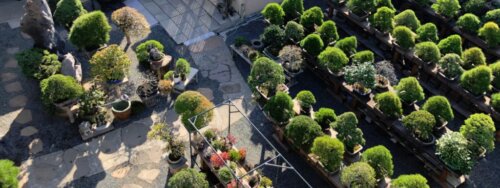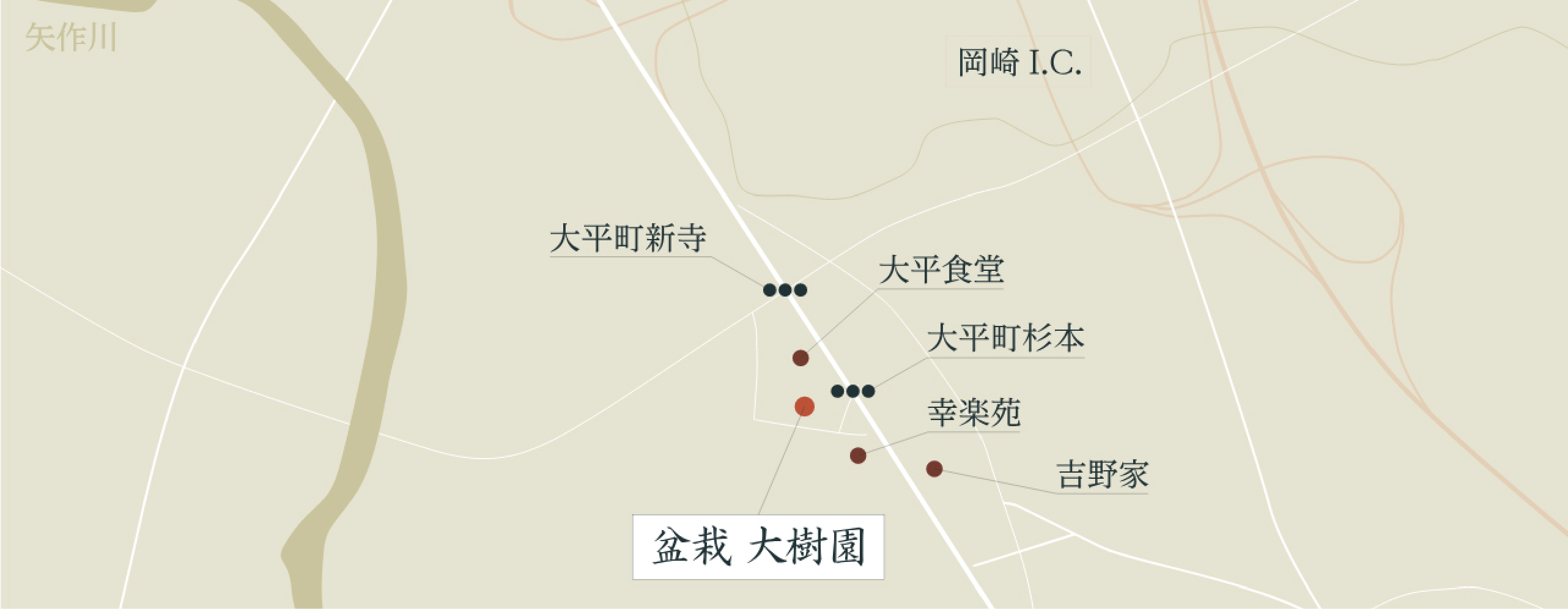Issued by Z-EN (Original link is here) 2022/6/30
This interview was featured in “Z-EN”, an information media for enjoying management. We talked about the bonsai industry today, our challenges, and our thoughts on bonsai NFT.
Breathing new life
into the tradition of the bonsai industry
The Challenge of the “Outsider” Fourth Generation#2
An interview with Takuya Suzuki, the fourth-generation owner of Daijuen, a long-established bonsai garden in Okazaki, Aichi Prefecture, who came to the bonsai industry from a different industry and has been involved in various changes.
In the first part of the article,“Breathing new life into the tradition of the bonsai industry
The Challenge of the “Outsider” Fourth Generation (Part 1)“,we talked about how he inherited a famous bonsai garden that has been in existence since 1934 and how he continues to develop new customers by confronting the industry’s difficulties and challenges head-on.
Currently, Mr. Suzuki is planning to develop the world’s first Bonsai NFT, a fusion of real and digital technologies, and is taking on the challenge of enhancing the artistic value of bonsai, a traditional Japanese culture.
In the second part of this interview, we ask him about his activities for Bonsai NFT, which aims to make the quality and value of bonsai widely known not only in Japan but also overseas, and about his vision to improve the reputation of bonsai.
CONTENTS
Chapter1
1 World’s first! The Challenge of Bonsai NFT, a Fusion of Real and Digital Bonsai
2 Problems in the Bonsai Industry
2.1 Many problems behind overseas popularity
2.2 Difficult import/export situation
Chapter2
1 For the bright future of bonsai
1.1 NFT plays a role in setting a proper value standard for bonsai
1.2 The next generation will innovate the bonsai industry
【Chapter 1】
World’s first! The Challenge of Bonsai NFT, a Fusion of Real and Digital Bonsai
Z-EN: It is wonderful to see your willingness to try different initiatives from an outside perspective! Furthermore, I understand that you are developing a bonsai NFT using the now popular blockchain technology!
Takuya Suzuki (Suzuki) : Yes.Since swords and armor, which are traditional Japanese art objects, have been made into NFTs and have gained popularity overseas, we are taking on the challenge in the hope that bonsai NFTs will also become a hot topic among young people.
Bonsai NFTs already exist in the world. However, there are no NFTs for so-called high-end bonsai that have been selected for the Kokufu Exhibition, the highest authority in the bonsai world, or that have won the Kokufu Award, the highest award in the bonsai world. In addition, there is still no NFT anywhere that is connected to the real thing.
Five bonsai will be NFTed in this project. The composite factors that value the bonsai, such as its shape, historical value, and history of being owned by a famous person, will also be proven on the blockchain.
The NFT buyer takes ownership of the actual bonsai, which is unique in the world, while leaving the management to us. And you can view it digitally anytime, anywhere.
The bonsai will be modeled in 3D when it is converted to NFT, so that it can be carefully viewed from all directions. When the digital bonsai is displayed in the metaverse in the future, the buyer can enjoy it as a symbol tree or build a house under it.

The nameplate of Chinese juniper (left) and Hibai Japanese apricot (right) to be converted to NFT.
*There are a total of five species to be converted to NFT. (Photos provided by Suzuki)
Problems in the Bonsai Industry
2.1 Many problems behind overseas popularity
Z-EN: Oh, my! It’s a dream come true. It is wonderful. It seems that the reason you are challenging the Bonsai NFT is because of your thoughts on the problems facing the bonsai industry today.
Suzuki : I am on a mission to preserve bonsai as a traditional Japanese culture and art form in Japan.
This NFT is one way to accomplish that mission, we believe.
Like art, bonsai can only increase in value when conditioned and managed in the proper environment.
We, Daijuen, have also played a role in this.
But unfortunately, the declining domestic bonsai market makes it difficult to expand domestic sales.
Therefore, we are forced to sell bonsai to foreign markets.
Bonsai as an art form takes decades or even centuries to create. Of course, bonsai growers also look far into the future and work hard to create bonsai works of art. However, in many cases, overseas sales end after the product is sold out, and immediate profits are inevitably prioritized.
Many bonsai gardens give away their bonsai for the sake of the garden’s survival without any means of proving the value of the bonsai they own.
Some wholesalers have taken advantage of this and built a business by buying cheaply from bonsai gardens and selling at high prices to overseas end-users.
This fact has become transparent, and the price of bonsai has been questioned, and in the past has been weary of the wealthy in the country.
We are very happy to see more and more bonsai enthusiasts from overseas deepening their understanding of Japanese culture.
However, if bonsai are sold overseas without regard to their intrinsic value because there is no domestic market for them, wonderful bonsai will disappear from the domestic market. The bonsai industry will eventually decline.
I believe that this situation must be broken for the sake of the young people who will take over the bonsai industry and carry on the bonsai garden in the coming generations.
2.2 Difficult import/export situation
Z-EN: I see. I had heard that bonsai is very popular overseas, but I didn’t realize there was such a problem.
Suzuki : Prices are higher overseas now. Prices in Japan have not risen for decades, so they have not been able to keep up with overseas price increases and are still selling at the same old prices.
The majority of its exports go to China, Europe and the United States of America.
As long as they have been grown and maintained in an officially registered bonsai garden for at least two years, they can be exported with soil, but Japanese censorship regulations, including soil disinfection and pest control, are very strict.
Then there is the opinion that we should buy good bonsai materials from overseas, manage them in Japan, and sell them, but it is not easy to get materials nowadays due to the rising import prices.
【Chapter2】
For the bright future of bonsai
1.1 NFT plays a role in setting a proper value standard for bonsai

Z-EN: What are your thoughts on how to get out of this situation?
Suzuki : I would like to clarify the value of bonsai. If the seller can show that the bonsai is worth this amount because it is in this condition now, but if it is cared for properly, it will be worth this amount, the buyer will have a basis for judging the value and confidence in the bonsai will increase. I think the number of buyers will also increase.
When I experience the process of carefully managing and arranging the branches that grow millimeters every year over the decades and centuries of growing bonsai, I think the current price of bonsai is very low.
If people understand the value of bonsai and buy them at a fair price, it will open up the future of the bonsai industry and protect the traditional culture of Japan.
I believe that the NFT is one of the ways we can create that standard of value.
We strongly hope that people who did not have bonsai before will invest in bonsai and that this valuable Japanese art form will not leave the country at a lower price.
Z-EN: That’s wonderful. It seems that this was also the reason why you insisted on tying the ownership of the actual bonsai to the Bonsai NFT concept.
Suzuki : The purpose of working on NFT is not just to digitize, but to spread the value of bonsai, so the real thing must be there.
In the bonsai world, it is customary for the owner to deposit the bonsai in a bonsai garden. This is one way of entrusting the management to professionals, but there is also another aspect in which people feel that the fact that they have entrusted their bonsai to Daijuen is a status symbol.

So I hope that Bonsai NFT owners will be able to view their bonsai from anywhere in the world, and also feel the status of having their bonsai in Daijuen (laughs).
1.2 The next generation will innovate the bonsai industry
Z-EN: What are your goals for the future?
Suzuki : I would like to continue to develop and implement ideas for mechanisms to increase the number of people who enjoy bonsai as much as possible.
To this end, we will consider ways to maximize the value of the Daijuen brand.
I keep in mind that “I am the one who will change the bonsai industry”.
I want to continue to do what is good for the industry.
I don’t think any Japanese person doesn’t know bonsai.
But there must be quite a few people who can talk about bonsai.
I believe that the industry will brighten up if the continuation of activities that get young people interested in bonsai and help those who are willing to take over and spread the techniques bear fruit!
Thank you for reading.
The first part of the article is Here!
“Breathing new life into the tradition of the bonsai industry
The Challenge of the “Outsider” Fourth Generation (Part 1)“


